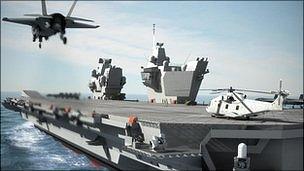Chancellor raises aircraft carrier hopes
- Published

Mr Osborne said it would cost more to cancel the contract for the carriers than to proceed with them
Chancellor George Osborne has indicated that the construction of two aircraft carriers will continue, despite planned defence spending cuts.
Mr Osborne told the BBC it would cost more to cancel contracts for their construction than to proceed with them.
The carriers are being built in sections in Rosyth, Glasgow, Portsmouth and Devon.
The budget for the Ministry of Defence has been finalised as part of the Chancellor's Spending Review this week.
The BBC learned recently that the carrier contract added large penalty clauses which would push the cost of cancelling one of them up to £5.7bn.
Even if both planned ships - HMS Queen Elizabeth and HMS Prince of Wales - are completed, the Royal Navy stands to lose a significant portion of its surface fleet, while the order for joint strike fighters for the carriers is expected to be scaled down substantially.
Mr Osborne told the BBC's Andrew Marr Show: "Of all the most difficult decisions we have had to face, aircraft carriers has been the most difficult.
"We were signed up to contract we couldn't get out of. It was not obvious what planes will fly off these things as they are being built.
"It will literally cost us...more to cancel the things than to go ahead and build them."
Mr Osborne said the government had a plan which it would set out over the next few days.
Planes 'gap'
Meanwhile, Defence Secretary Liam Fox confirmed the carriers would be left without planes for a period because of cuts to the military budget in the Spending Review.
In recent days, two former First Sea Lords - Admiral Lord West and Admiral Sir Jonathon Band - have warned that a decision to withdraw Harrier jets before the arrival of new Joint Strike Fighter F35s in 2018 would leave Britain unable to fight another Falklands War.
Dr Fox said there would be a "gap" between the phasing out of the Harriers and the US-built F35s coming into service, but insisted this would not put the Falklands at risk.
Britain currently has sufficient basing and over-flight rights to allow it to deploy air power wherever it wants in the world, even without fixed-wing aircraft on board its carrier fleet, he told BBC1's Politics Show.
He said: "The Falklands are defended now by our deterrence, by having Typhoon aircraft, because we have submarine capabilities, because we have far greater military capabilities than Argentina has.
"Just in case anybody gets the idea that the UK is weak in the Falklands - forget that."
- Published7 October 2010
- Published16 October 2010